
Arizona Osteopathic Medical Association (AOMA)
2025 Summer Symposium
An On-Demand Event
Available August 1, 2025, through September 30, 2025
Agenda is Pending
Accreditation
The Arizona Osteopathic Medical Association (AOMA) is accredited by the American Osteopathic Association (AOA) to provide osteopathic continuing medical education for physicians.
AOMA designates this program for a maximum of 12.0 hours of AOA Category 1-A credits and will report CME and specialty credits commensurate with the extent of the physician's participation in this activity.
The Arizona Osteopathic Medical Association (AOMA) is accredited by the Accreditation Council for Continuing Medical Education (ACCME) to provide continuing medical education for physicians.
AOMA designates this live activity for a maximum of 12.0 AMA PRA Category 1 Credits™. Physicians should claim only the credit commensurate with the extent of their participation in the activity.
AOMA Cancellation Policy
All refund requests must be in writing and received by July 1, 2025. A $25 processing fee will be deducted from the registration fee. Refunds will not be available after July 1, 2025. A credit for a future CME event may be issued.
AOMA Grievance Policy
The Arizona Osteopathic Medical Association (AOMA) strives to provide continuing medical education programs to fulfill the attendees' needs and meet the American Osteopathic Association (AOA) accreditation requirements and the Accreditation Council for Continuing Medical Education (ACCME) accreditation requirements. Comments, questions, or complaints should be submitted in writing to Teresa Roland, Director of Education, by mail to AOMA, 3039 W Peoria Ave, Suite C102-158, Phoenix, AZ 85029, or email teresa@azosteo.org.
| Substance abuse treatment for practicing physicians - Steven Boles, DO (4.6 MB) | 68 Pages | Download |
| Demystifying spine surgery in 2025: Current evidence and a guide to modern spine care - Andrew CHung, DO (5.1 MB) | 38 Pages | Download |
| Optimizing outcomes in Type 2 Diabetes: From guidelines to practice - Carly Ernst-Kuhn, DO (1.4 MB) | 33 Pages | Download |
| Sweet turns sour: Youth type 2 diabetes in focus - Nancy Horlick, MD, FAAP, DABOM (4 MB) | 25 Pages | Download |
| Introduction to forensic medicine - Gregory McDonald, DO (11.7 MB) | 38 Pages | Download |
| HIV management - Rachael Pellegrino, MD, MPH (2.6 MB) | 29 Pages | Download |
| Drug overdose trends - Mark Person, MSP (1.5 MB) | 13 Pages | Download |
| How to listen and help someone with suicidal thoughts - Randall Ricardi, DO (2.3 MB) | 31 Pages | Download |
| Prescribing GLP-1s: What to know about liability exposure and risk mitigation - Jeanne Varner Powell, JD (911.8 KB) | 12 Pages | Download |
| Vector-borne disease: Arizona - Mariah Zeigler, DVM, MPH, DACVPM (4 MB) | 22 Pages | Download |
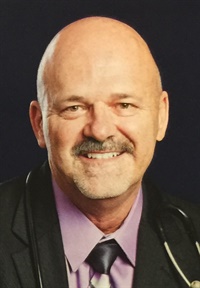
Dr. Steven Boles received his D.O. degree from C.O.M.S. in 1981; interned at Phoenix General Hospital and then received additional residency training in Internal Medicine.
He was trained in Addiction Medicine at St. Luke’s Behavioral Health Center in Phoenix, AZ, from April 1999 through August 2000, by C.J. Shaw, M.D., and the nursing staff.
Dr. Boles was initially certified in Addiction Medicine by the
American Society of Addiction Medicine (ASAM), in 2000, and then recertified in 2008. He became an ASAM Fellow in 4/2008, after 8 years of preparation.
Dr. Boles was in the first group of physicians that were granted Board Certification and Diplomate status by the American Board of Addiction Medicine, in 2009.
He received 2 Board Certifications from the AOBFP:
He has developed and been privileged to teach an Addiction Medicine Course to 1st & 2nd-year Osteopathic medical students at AZCOM-Midwestern University for the last 26 years.
He has maintained his practice for over 42 years in Phoenix, AZ.,
where he is supported by his beautiful wife Natalie, and their 4 adult children.
He has become a dog lover over all this time and has 3 miniature Australian Shepherds.
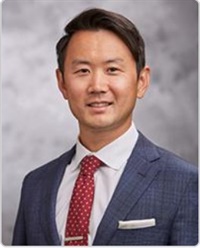
Dr. Andrew Chung is a board-certified, double fellowship-trained orthopedic spine surgeon. He completed his orthopedic surgery residency at the Mayo Clinic in Arizona, followed by a combined neurosurgical and orthopedic spine fellowship at the Keck School of Medicine. He went on to complete a second fellowship at Cedars-Sinai and DOCS hospitals in Beverly Hills, California.
Dr. Chung has authored over 65 peer-reviewed articles in leading spine and orthopedic journals and contributed numerous book chapters on spinal surgery. His research has been presented nationally and internationally, with involvement in more than 100 abstracts. He is widely regarded as a national expert in endoscopic spine surgery and frequently teaches and mentors other surgeons in this evolving field.
He currently serves as a Clinical Assistant Professor in the Department of Orthopedics at the University of Arizona College of Medicine, Clinical Faculty at Midwestern University, and adjunct clinical faculty at the Mayo Clinic Department of Orthopedics in Arizona.
Dr. Chung is an active member and invited faculty of the Society of Minimally Invasive Spine Surgery (SMISS), the World Endoscopic Spine Society (WUBES), and the Korean American Spine Society (KASS).
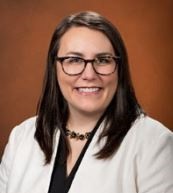
Dr. Carly Ernst is a board-certified Internal Medicine and Obesity Medicine physician with specialized training in Culinary Medicine. She currently practices as an Obesity Medicine Physician with Abrazo Medical and Surgical Weight Loss in Scottsdale, Arizona, where she integrates evidence-based medical therapies with lifestyle and nutrition-focused care to support long-term health and weight management.
Dr. Ernst earned her Doctor of Osteopathic Medicine degree from A.T. Still University–Kirksville College of Osteopathic Medicine and completed her Internal Medicine residency at the University of Kansas Medical Center.

Dr. Horlick is a Board-Certified Pediatrician with over 25 years of experience in the Phoenix area. After relocating to Arizona from central Illinois, Dr. Horlick attended the University of Arizona College of Medicine and completed her pediatric residency at the Medical College of Wisconsin, Children’s Hospital of Wisconsin. Since returning to Arizona in 1999, she has been dedicated to providing high-quality pediatric care and has recently joined Midwestern University as an Assistant Professor of Pediatrics in January 2025.
A Fellow of the American Academy of Pediatrics, Dr. Horlick is deeply passionate about preventive medicine and its ability to empower families to live healthier lives. She has a particular interest in nutrition, fitness and eating disorders, areas she believes are vital in combating the current obesity epidemic. To expand her expertise, she joined the Phoenix Children’s Hospital CARE team, where she honed her skills in caring for children and adolescents affected by obesity and its related conditions. In 2022, Dr. Horlick furthered her commitment to this field by attaining Board Certification in Obesity Medicine, and she aims to contribute to the growth of a Pediatric Obesity Program at Midwestern University.
Outside of her professional endeavors, Dr. Horlick enjoys an active lifestyle, including yoga, Peloton cycling, and healthy cooking. She values spending time with her family and lives in the Phoenix area with her husband, Mitch, and their two children, who are currently in college.

Gregory McDonald, DO, graduated from the Philadelphia College of Osteopathic Medicine in 1989. He went on to complete a residency in anatomic pathology at the Lankenau Hospital followed by a forensic pathology fellowship at the University of Pennsylvania and the Medical Examiner's office in Philadelphia, Pennsylvania. After completion of this fellowship, he served for 14 years as an assistant medical examiner in Philadelphia, Pennsylvania.
Dr. McDonald formally served as Dean of the School of Health Sciences and is a professor and chairman of the Department of Forensic Medicine and Pathology at the Philadelphia College of Osteopathic Medicine. His work at PCOM also includes serving as the program director of the Master of Science (MS) in Forensic Medicine program. Dr. McDonald lectures extensively to DO, physician assistant, and forensic medicine students, as well as providing residents and attending physicians with continuing education programs. He has been the recipient of multiple awards for outstanding teaching.
In addition to his teaching duties at PCOM, he has lectured regionally and nationally in subjects including post-mortem changes, determination of cause and manner of death, blunt and sharp force injury, asphyxiation, and child abuse. Dr. McDonald is also the chief forensic pathologist of Montgomery County, Pennsylvania.
He has served as the Vice Chairman and Chairman of the American Osteopathic Board of Pathology, where he is also the Chairman of the subcommittee on Forensic Pathology. Certified in both anatomic pathology and forensic pathology, he has completed more than 8,000 autopsies and has testified in more than 800 court cases.
Dr. McDonald has trained in the martial arts for approximately 25 years. He is trained in karate, judo, wrestling, Brazilian jujitsu, and the Israeli martial art Krav Maga.

Ankur Patel, DO MHA is a partner physician with Southwest Kidney Institute in Phoenix, AZ. he did his undergraduate at UC Irvine before going to medical school at Kirksville College of Osteopathic Medicine (now known as AT Still University – Kirksville Campus). He also obtained a Masters in Health Administration at AT Still University. He did his residency in Internal Medicine at Good Samaritan Medical Center in Phoenix, AZ (now known at Banner University Medical Center – Phoenix Campus) and did one year of Geriatric fellowship there. He went on to do a fellowship in Nephrology at Allegheny General Hospital in Pittsburgh, PA before returning to Phoenix, AZ in 2010. He has been a clinical nephrologist since 7/2010 with Southwest Kidney institute primarily in the West encompassing Goodyear, Surprise, West Phoenix, Sun City and Surprise.
During his time here, he has had the opportunity to have students rotate with him from Midwestern University’s DO and PA program and AT Still University DO program. He has been involved with the National Kidney Foundation Medical Advisory Board and honored to be elected Chairman earlier this year. He has been fortunate enough to volunteer with NKF’s community outreach Path to Wellness program as well. He has served as Medical Director of several dialysis units. He is passionate about contributing to his profession and the care of patients with kidney disease.
Dr. Patel is married with two daughters and enjoy traveling, following the AZ Cardinals and other sports in my free time.

Rachael Pellegrino is an infectious diseases physician and researcher. She is an Instructor in the Division of Infectious Diseases at Vanderbilt University Medical Center (VUMC). She received her MD and MPH from Johns Hopkins University and completed her Internal Medicine residency and Infectious Diseases fellowship at VUMC. Her research investigates methods for optimizing the delivery of preventative care services in comprehensive HIV care. Her current projects include exploring the implementation of standardized practices for prescribing Doxycycline post-exposure prophylaxis to reduce sexually transmitted infections and methods for improving cancer prevention, screening, and patient-centered outcomes for people with HIV.

With over 20 years of experience spanning behavioral health, public health, and managed care systems, Mark Person, is a seasoned leader in developing and overseeing programs that address mental health and substance use disorders. As Public Health Program Manager for Community Mental Health and Addiction at the Pima County Health Department, he collaborates closely with healthcare providers, behavioral health systems, and public agencies to improve care coordination, reduce stigma, and enhance outcomes for individuals with serious mental illness and co-occurring substance use disorders. Mark has led clinical and operational efforts through major public health crises, including the opioid epidemic, and COVID-19 pandemic, and brings a systems-level understanding of both funding mechanisms and frontline service delivery. His work emphasizes interdisciplinary collaboration, data-informed decision-making, and population health strategies aimed at improving access, reducing harm, and continuity of care.

Dr. Ricardi is a Board-Certified Adult and Child Psychiatrist at Phoenix Children’s Hospital. He completed his medical school training at the Chicago College of Osteopathic Medicine and his residency and fellowship at Wayne State University in Detroit Michigan in 1989 prior to joining Phoenix Children’s Hospital in 1990.
He holds faculty appointments as Clinical Professor in the Department of Child Health and Psychiatry at the University of Arizona College of Medicine-Phoenix, Barrow Neurological Institute, Creighton University School and Medicine and Instructor in Pediatrics at Mayo Clinic College of Medicine and Science.
At Phoenix Children’s Hospital , he has transitioned to Vice-Chair in the Department of Psychiatry, Associate Director of the Consultation-Liaison service and the Associate Program Director for the fellowship training program in Child and Adolescent Psychiatry.
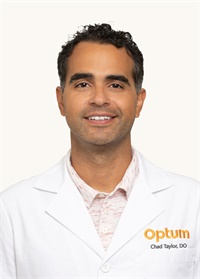
Dr. Chad Taylor was raised in Eden Prairie, Minnesota. He received his undergraduate education at Minnesota State University and graduated in 2009. Subsequently, Dr. Taylor pursued his doctorate in osteopathic medicine at A.T. Still School of Osteopathic Medicine in Arizona and graduated in 2013. Dr. Taylor’s passion was rural family medicine and hospitalist medicine. However, after completing his family medicine residency program in 2016, he was recruited by a dermatology practice, Mohave Skin and Cancer Clinic, in Kingman, AZ. He became a partner until the practice was sold in 2021. Dr. Taylor then returned to the only place that felt like home, Flagstaff AZ. He practices dermatology and family medicine at Optum Primary care, and is the Regional Director of Medical Education for A.T. Still University School of Osteopathic Medicine for the northern AZ region.

Jeanne Varner Powell is the Senior Legal Risk Consultant for the Mutual Insurance Company of Arizona (MICA) Risk Team. In this role, she passes on to MICA insureds what she learned during 20 years of defending medical malpractice cases. She develops written content to educate physicians, advanced practice providers, and ambulatory care practices about medical professional liability risks. She consults with insured physicians and their practices on risk management issues, risk reduction strategies, and improving patient outcomes. In addition, she contributes articles to local medical societies and other health care professional organizations and gives presentations on risk management issues to students enrolled in graduate medical education programs.
Prior to joining MICA in 2020, Jeanne defended hospitals, nurses, care facilities, physicians, and other health care professionals in medical malpractice cases. Outside the office, you can usually find her horseback – either exploring new country or chasing cows. She is also an avid hiker and camper.
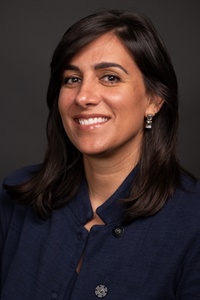
Dr. Lisa Villarroel MD, MPH is the Chief Medical Officer for Public Health at the Arizona Department of Health Services. Dr. Villarroel has served as the medical director for the emergency response to Ebola, Zika, opioid, vaping, and the COVID-19 crises. She has a particular interest in the public health approach to opioid use disorder and has co-led the creation of the Arizona Pain and Addiction Curriculum, the Arizona Opioid Prescribing Guidelines, and she now co-chairs the Arizona Clinical Opioid Workgroup focused on Medication for Opioid Use Disorder metrics. She received her bachelors in biology at Princeton University, her Doctor of Medicine at Northwestern University, a masters in public health, and a certificate in Media and Medicine from Harvard Medical School.

Dr. Mariah K. Zeigler is an Associate Professor of Public Health at Midwestern University. She supports the delivery of the Master of Public Health (M.P.H.) degree program at Midwestern University’s Glendale, AZ and Downers Grove, IL campuses and provides guest lectures in other Midwestern University healthcare professional programs and holds a Joint appointment with both the College of Veterinary Medicine (CVM) and the Arizona College of Osteopathic Medicine (AZCOM). She directs four core courses in the M.P.H. Program addressing diverse topics such as climate change, ecosystem stability, public health and health systems, environmental and occupational health, and public health emergency preparedness. Dr. Zeigler earned a Bachelor of Science in Animal Bio-Science with Honors in Veterinary Science from The Pennsylvania State University in 2005 and her Doctor of Veterinary Medicine from the Virginia Maryland Regional College of Veterinary Medicine in 2009. In 2007, Dr. Zeigler was the recipient of a United States Air Force Health Professional Scholarship Program (HPSP) scholarship. After graduating from veterinary school, she served in the United States Air Force as a Public Health Officer. Following honorable separation in 2013, Dr. Zeigler practiced companion animal medicine while completing her M.P.H. for Practicing Veterinarians from the University of Iowa. She earned her M.P.H. in 2017 and became a Diplomate in the American College of Veterinary Preventive Medicine that same year. In addition to directing and teaching courses in the M.P.H. program, she regularly teaches in the CVM and in AZCOM. Dr. Zeigler joined the faculty at Midwestern University in 2020.

2025 Summer Symposium
On-Demand Video Links
Please click on the link under the title of the lecture to play the lecture video.
Substance abuse treatment for practicing physicians
Steve Boles, DO
ttps://vimeo.com/1103538716/dd361899a2
Demystifying spine surgery in 2025: Current evidence and a guide to modern spine care
Andrew Chung, DO
https://vimeo.com/1106198018/80a84883bd
Optimizing outcomes in Type 2 Diabetes: From guidelines to practice
Carly Ernst-Kuhn, DO
https://vimeo.com/1103540345/3c7216a40f
Sweet turns sour: Youth type 2 diabetes in focus
Nancy Horlick, MD, FAAP, DABOM
https://vimeo.com/1103541271/657046b71d
Introduction to Forensic Medicine
Gregory McDonald, DO
https://vimeo.com/1103544121/402b2cb784
Review and updates in chronic kidney disease
Ankur Patel, DO
https://vimeo.com/1103865590/63088a14d9
HIV management
Rachael Pellegrino, MD, MPH
https://vimeo.com/1105257622/a3f447cedd
Drug overdose trends
Mark Person, MSP
https://vimeo.com/1103545634/cfe9c7f042
How to listen and help someone with suicidal thoughts
Randall Ricardi, DO
https://vimeo.com/1103547099/f646aff234
Dermoscopy 101: Identifying melanocytic lesions
Chad Taylor, DO
https://vimeo.com/1103574793/5675011e27
Prescribing GLP-1s: What to know about liability exposure and risk mitigation
Jeanne Varner Powell, JD
https://vimeo.com/1103550445/ade10c6d8d
Drug overdoses: Data and implications in Arizona
Lisa Villarroel, MD, MPH
https://vimeo.com/1106486277/db98ec5a56
Vector-borne disease: Arizona
Mariah Zeigler, DVM, MPH, DACVPM
https://vimeo.com/1103549020/32fe15b767
Attestation Instructions
To receive continuing medical education credits for the Arizona Osteopathic Medical Association's (AOMA) 2025 Summer Symposium, you MUST complete the online attestation and evaluation form for the hours attended by September 30, 2025.
Follow the steps below to complete your attestation:
Log into your account on our website, azosteo.org.
In the upper right corner, click on sign in or, if it has your name, click on your name.
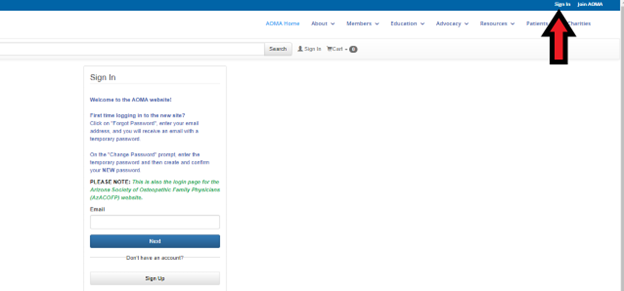
On your main account page, click the My List Tab, find the 2025 Summer Symposium.
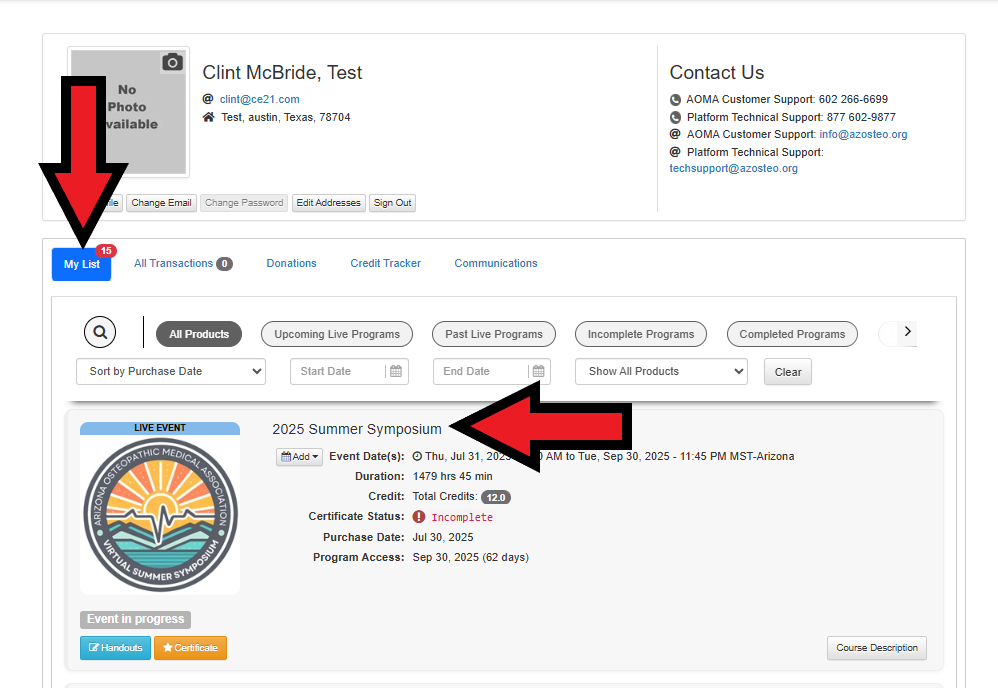
Click the gold certificate button.
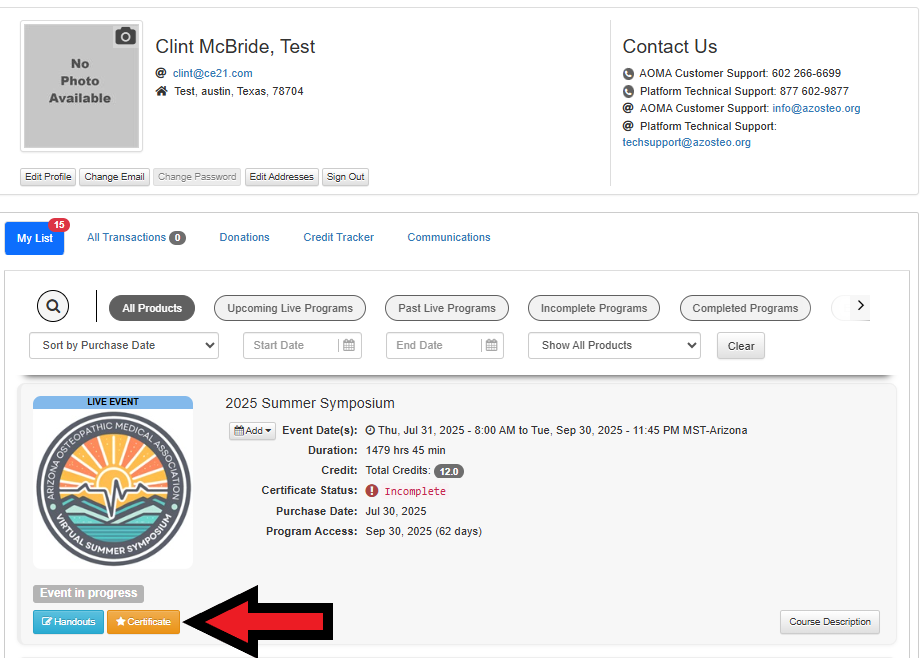
Click on Customer Attendance Confirmation.
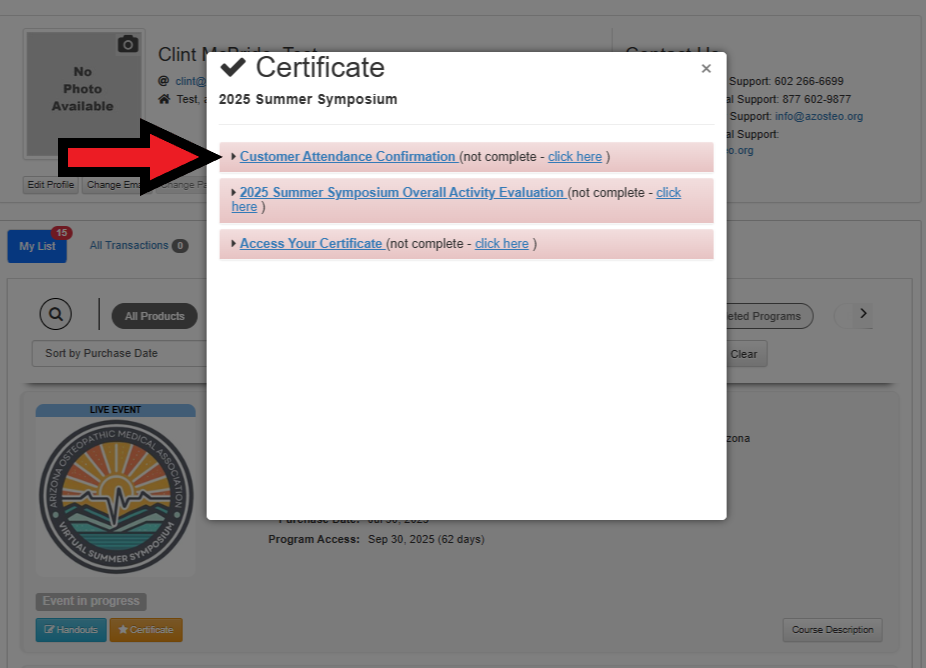
You must attest to each lecture you viewed to receive credit. Make sure you scroll to the bottom and click on submit before closing.
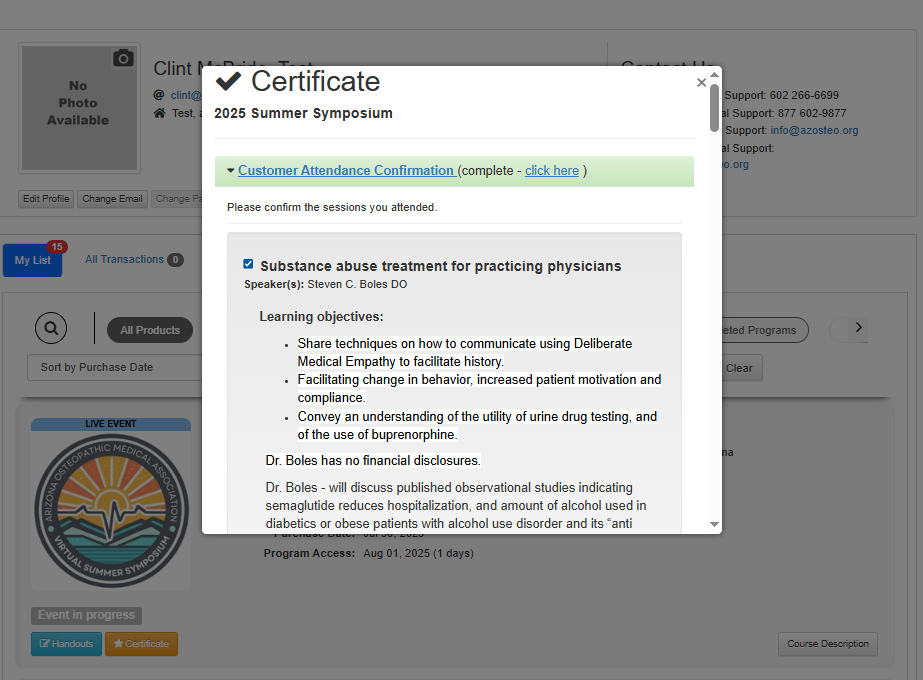
If you do not check all the lectures viewed at one time, when you return to check the remaining lectures, you will need to click on the edit button.
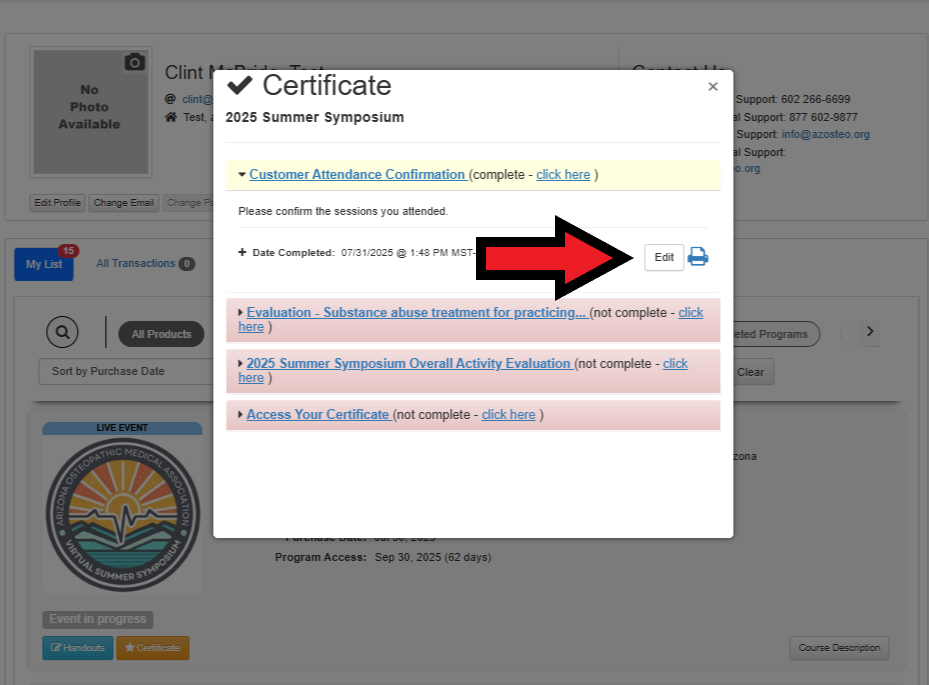
Each lecture you clicked on will then appear below. You must click on each individual lecture and click on attended or did not attend. There are additional questions you can answer. They are not mandatory, but we appreciate the feedback. Be sure to scroll to the bottom and click Submit.
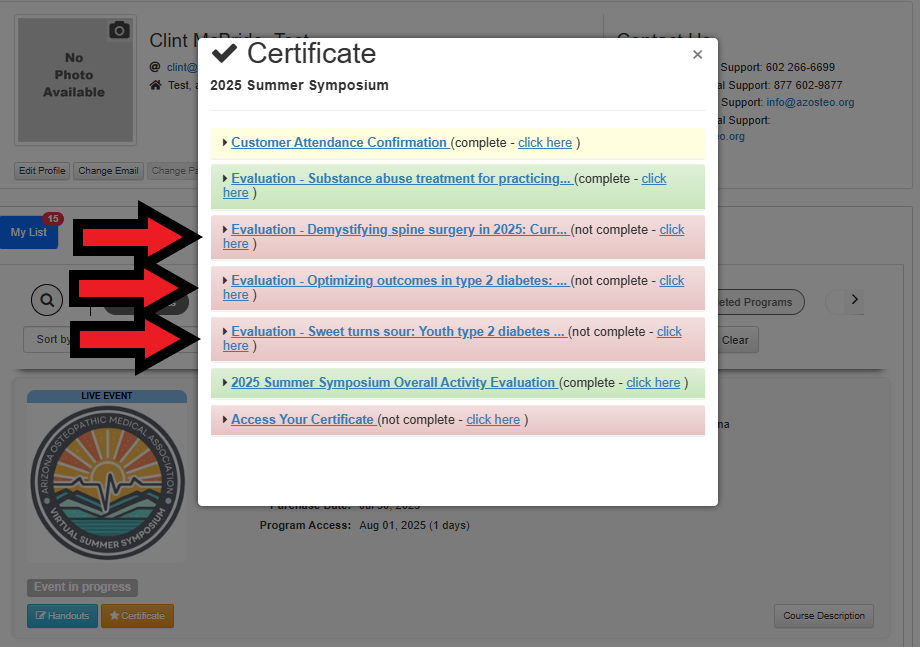
After attesting to the individual lectures, you must complete the Overall Activity Evaluation in order to print or email your CME certificate.
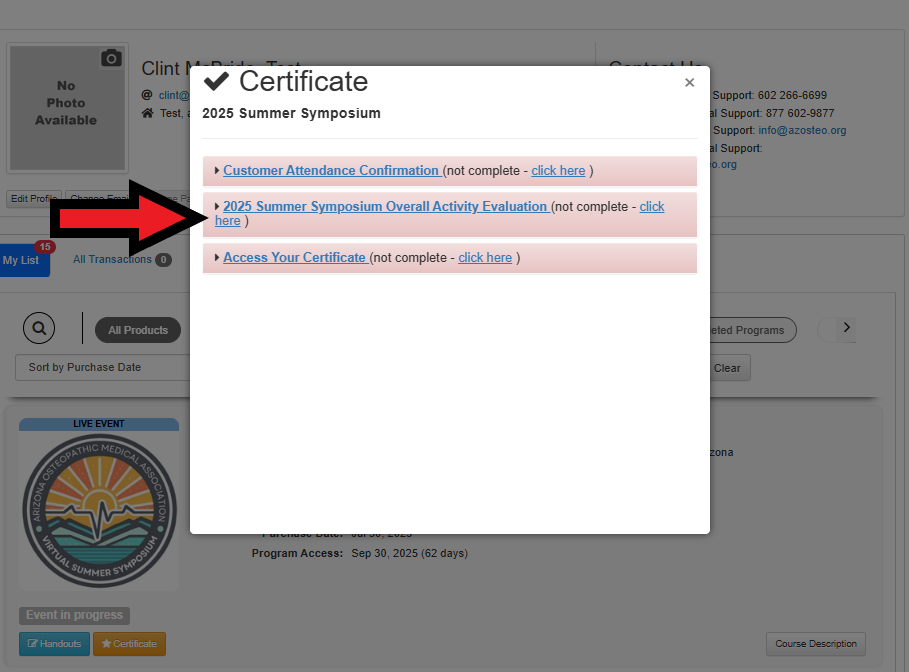
After completing the Customer Attendance Confirmation and the 2025 Summer Symposium Overall Activity Evaluation, you may then print or email your CME certificate. Please be sure to check your CME certificate to make sure the hours are correct.
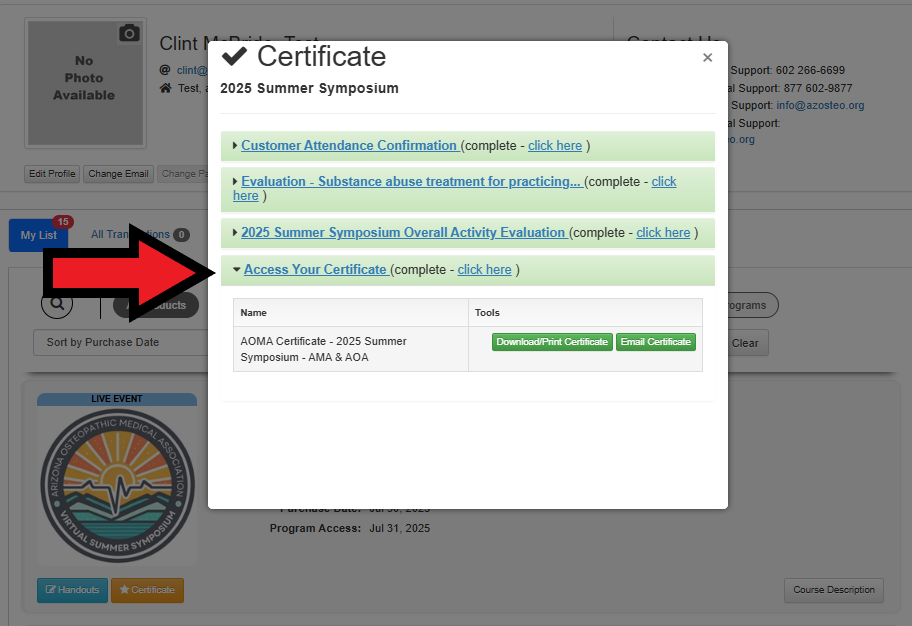
To avoid additional fees for the issuance of CME credits for the AOMA 2025 Summer Symposium, all attestation forms MUST be completed by September 30, 2025. After this date, online access to the attestation forms will be closed and requests for CME credits from the AOMA 2025 Summer Symposium will be subject to a $25 fee.
AOMA will report credits to the American Osteopathic Association (AOA) by October 6, 2025, if not sooner.
Please contact Teresa Roland, Director of Education, at teresa@azosteo.org or 602-266-6699 with questions.
Learning objectives:
Dr. Boles has no financial disclosures.
Dr. Boles - will discuss published observational studies indicating semaglutide reduces hospitalization, and amount of alcohol used in diabetics or obese patients with alcohol use disorder and its “anti consumption” effect.
Learning objectives:
Dr. Chung is a consultant for Amplify Surgical, Medtronic and SI-Bone
Learning objectives:
Dr. Ernst-Kuhn has no disclosures.
Learning objectives:
Dr. Horlick has no disclosures.
Learning objectives:
Dr. McDonald has no disclosures.
Learning objectives:
Dr. Patel has no disclosures.
Learning objectives:
Dr. Pellegrino has no financial disclosures.
Dr. Pellegrino will discuss the use of 2-1-1 dosing of oral PrEP (emtricitabine/tenofovir disoproxil fumarate) for HIV is not FDA approved, but this method of PrEP dosing is included in the CDC PrEP guidelines so is important to note. I have clearly identified in the slide that this is not FDA approved but is a part of the CDC PrEP guidelines.
Learning objectives:
Mr. Person has no disclosures.
Learning objectives:
Dr. Ricardi has no disclosures.
Learning objectives:
Dr. Taylor has no disclosures.
Learning objectives:
Ms. Varner Powell has no disclosures.
Learning objectives:
Dr. Villarroel has no disclosures.
Learning objectives:
Dr. Zeigler has no disclosures.
Faculty and Planning Committee Disclosures
The following faculty and/or planning committee members have indicated that they may have a relevant financial relationship with an ineligible company that could be perceived as a potential conflict of interest.
Faculty Disclosures
Planning Committee Disclosures
All relevant financial relationships have been mitigated.
All other faculty and planning committee members have no relevant financial relationships with ineligible companies.
Disclosure of Unlabeled/Unapproved Use of Drugs and/or Products:
Accreditation
The Arizona Osteopathic Medical Association (AOMA) is accredited by the American Osteopathic Association (AOA) to provide osteopathic continuing medical education for physicians.
The AOMA designates this program for a maximum of 12.0 hours of AOA Category 1-A credits and will report CME and specialty credits commensurate with the extent of the physician's participation in this activity.
The Arizona Osteopathic Medical Association (AOMA) is accredited by the Accreditation Council for Continuing Medical Education (ACCME) to provide continuing medical education for physicians.
The AOMA designates this enduring activity for a maximum of 12.0 AMA PRA Category 1 Credits™. Physicians should claim only the credit commensurate with the extent of their participation in the activity.